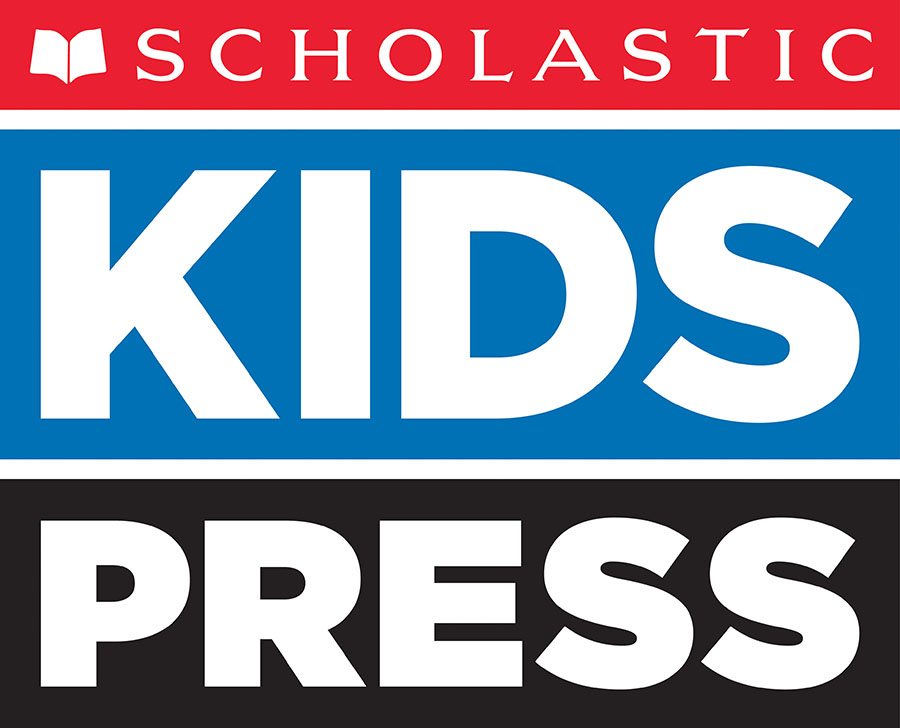KID REPORTERS’ NOTEBOOK
One-on-One With Stacey Abrams
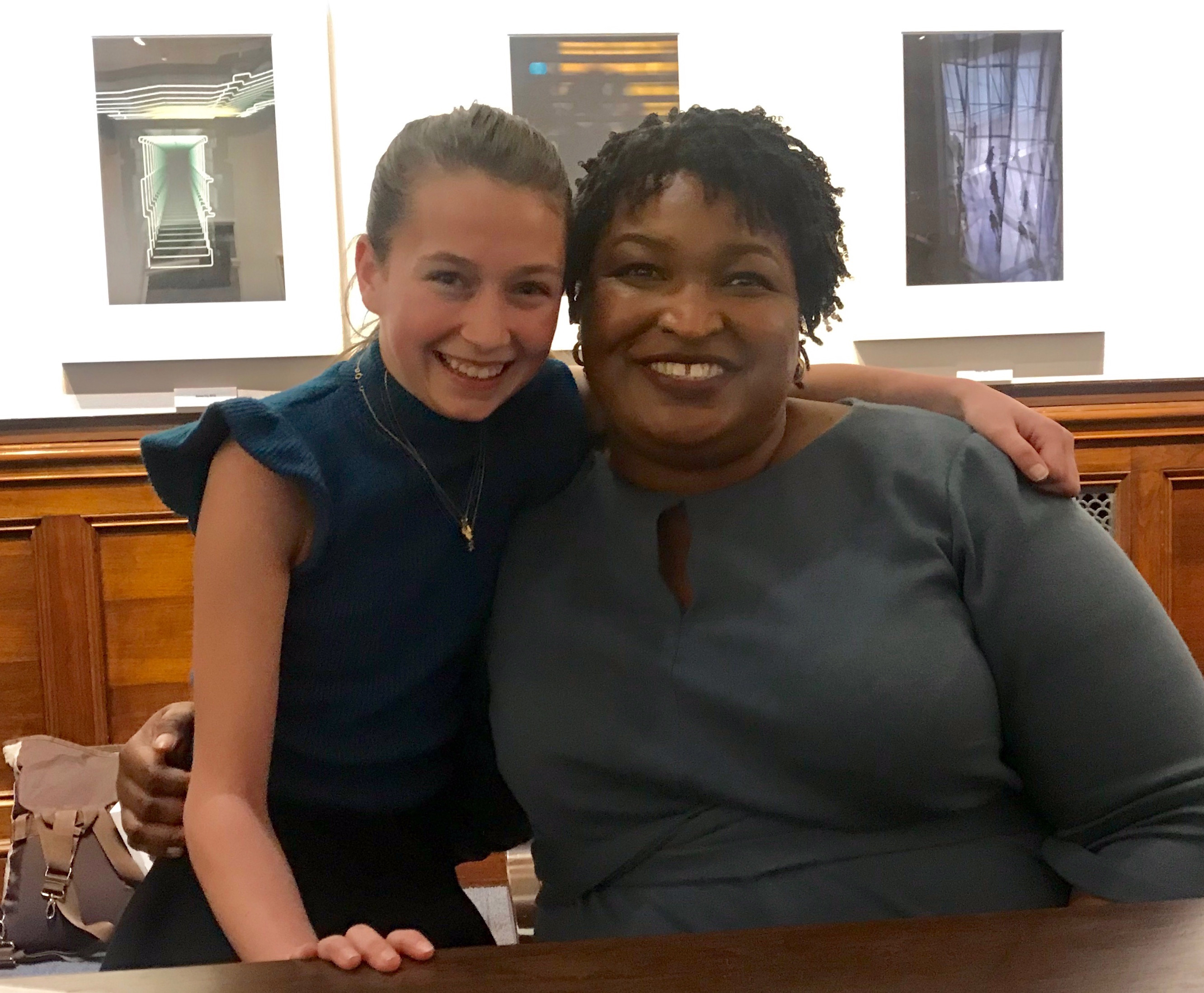
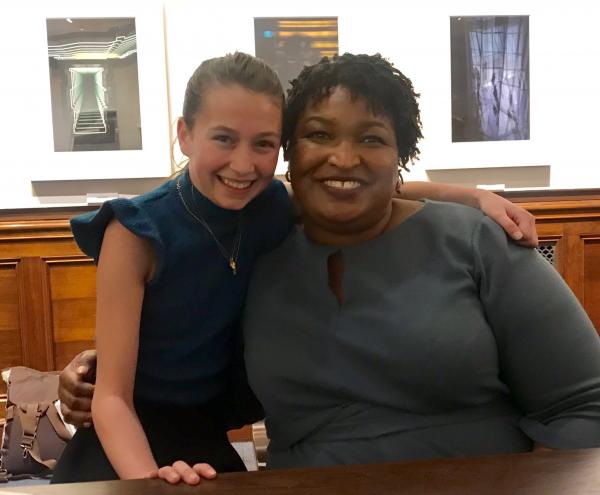
Amelia with Stacey Abrams at the 92nd Street Y in New York City
As the second of six children growing up in Mississippi and Georgia, Stacey Abrams spent much of her childhood caring for her younger siblings. Her responsibilities from an early age may be why she achieved so much, both in and out of politics, before she was even able to vote. A standout student with an interest in government, Abrams went from being a campaign volunteer to a speechwriter at the age of 17.
Abrams graduated with honors from Spelman College, earned a Master of Public Affairs degree at the University of Texas at Austin, and a Juris Doctor from Yale Law School. She was elected as a State Representative in Georgia at the age of 34 and went on to become minority leader of the Georgia House of Representatives.
It was in 2018 that Abrams entered the national spotlight when she ran unsuccessfully for governor of Georgia. She was the first Black woman in United States history to be the gubernatorial nominee of a major political party. She also was the first Black woman to deliver the rebuttal to the presidential State of the Union address, which she did in January 2019.
In April, I met Abrams before she addressed an enthusiastic audience at the 92nd Street Y in New York City. In a follow-up phone interview, I asked her about her education, her struggles, and her plans for the future. Here are highlights from our conversation, which has been lightly edited.
You have a long list of academic accomplishments. Did you find anything difficult as a student?
Yes! I was horrible at geometry! It was the first time I took a class where I simply did not understand the concepts. It taught me that even when you’re good at things, you’re not going to be good at everything. I wasn’t going to get an ‘A’ in that class. I talked to the teacher and asked if I could make up points. He let me write reports about each of the mathematicians we studied. I was able to use the fact that I was good at research and writing. I learned about the concepts, and I was able to understand why geometry was important. I still got a C [laughs]. But I learned something anyway.
Is there any other advice you would give to students facing challenges?
It’s OK to not understand. Sometimes, we feel like we should know everything. Ask for help. Keep trying. You can learn something from every experience.
I didn’t become a geometry whiz, but if you want to know about [mathematicians] Descartes or Archimedes, I can tell you everything you would want to know.
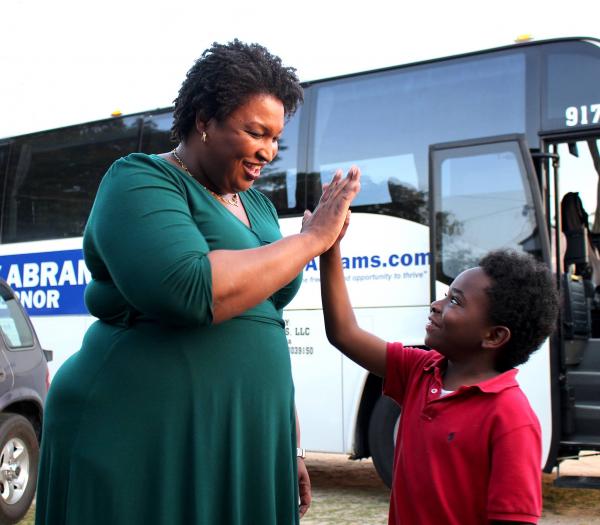
Abrams meets with a young constituent on the campaign trail during her gubernatorial bid in Georgia.
You graduated magna cum laude from Spelman College, which is an HBCU [historically Black college or university], and got into Yale Law School, which at the time had an overwhelmingly white student body. What was that transition like for you?
It was difficult less because of race, and more because of class. As a child, I went to school with predominantly white students. What was different about Yale was that it was predominantly wealthy. People who attended Yale had, by and large, come from families with very long academic pedigrees. For me, it was much more an issue of how do I adapt to being out of the South and with people who had resources and advantages I had not even imagined.
Did Yale do anything to support you?
They did. They helped me with financial aid. They had groups for women and African American students that let us find communities that shared our concerns. I was able to acclimate by volunteering in communities that had the same economic challenges. Yale not only permitted it. It encouraged it. That helped me to understand that even though I had remarkable academic opportunities in front of me, I could never forget where I came from. Being at a school that supported me was very helpful in the transition.
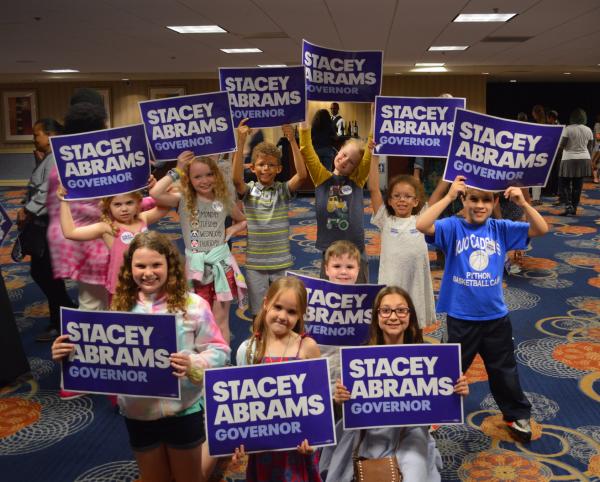
Abrams lost her gubernatorial race by a narrow margin. She has since become a national figure, with many people encouraging her to run for elected office again.
You’re a leader on the issue of voting rights and have worked to make sure all voices are heard. Do you believe in lowering the voting age to 16?
I believe that we should lower the voting age for school board elections. There is no one more directly impacted than students. They should have a say in how they are governed.
I think we should test it out for local elections. I do believe we need to investigate lowering the voting age for federal elections, but I’m not convinced yet.
I remember being 16. I remember how involved and engaged I was. While there certainly is a difference between being 16 and 18, I don’t know that the difference is wide enough to say that you should not be able to participate in federal elections, so I’m willing to be convinced.
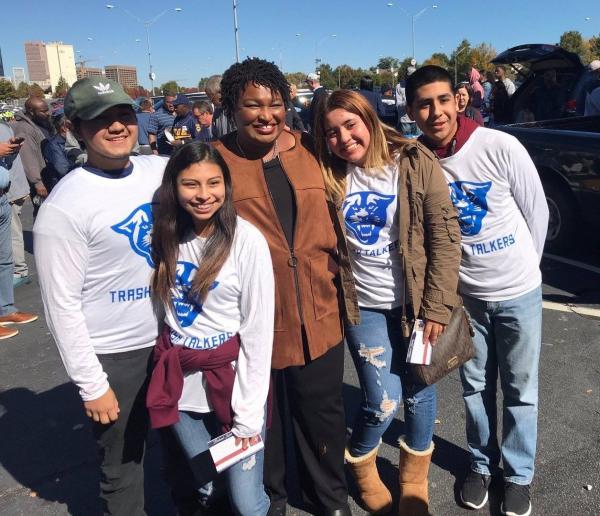
Abrams with students at a Georgia campaign event
Did you have any teens working on your campaign for governor?
A third of our interns were high school students. They showed up and canvassed, helped develop policy and our communications strategy, and participated in idea sessions. I believe in making certain that everyone impacted is a part of the conversation. I was the only candidate who proposed creating a youth council to advise the governor. You can’t have leaders who aren’t listening to the young people who are affected by our positions.
There has been so much political division in the last few years. Do you think my generation will ever see lawmakers come together?
I think it’s possible. We’ve always had political division, since the first elections. What’s different now is that we don’t seem to have an incentive to work together. I think the critical issues of climate change, health care, and poverty are going to force politicians to put aside ideological differences as a reason to not work together, and instead compel them to use those differences to help one another.
What advice would you give to young people who want to be involved in local and national politics but aren’t sure how to make their voices heard?
Volunteer with a politician, a campaign, or a community group. I got my first job in politics as a typist for someone running for Congress. I edited his speech, which I was given to type, and he actually promoted me to becoming a speechwriter! I was 17. I was with a group of young people who were all offered the opportunity to volunteer with his campaign, and I was the only one who took it. Showing up is the first job. You don’t know what you’re going to be allowed to do, but you’ll be allowed to do absolutely nothing if you aren’t there.
You’ve spoken about how you never felt you were good enough for certain opportunities. How did you find the confidence to know that you would have been a great governor?
When I didn’t win the Rhodes Scholarship [after college, Abrams became the first Black woman to be nominated for the prestigious award], that very much shook my confidence. I was afraid that I was not as smart or as accomplished as some people said I was. But I’m also very stubborn. I decided to apply to Yale anyway. I started thinking about my dad’s advice. He said, ‘Let other people tell you no. Never tell yourself no. If there’s something you want, fight for it.’ So if I think something is important, if I think I could be good at it, then I try. I’m not obligated to succeed. I’m obligated to do the best I can, and that’s different. I can’t guarantee myself success, clearly. But I can do the best job possible to meet my responsibilities.
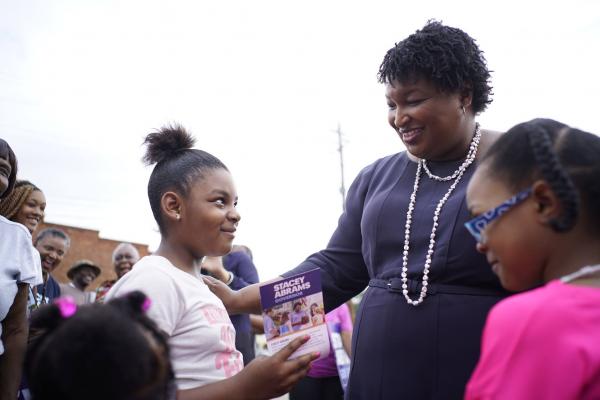
Abrams meets with young admirers in Georgia.
You received praise for your optimism about the Democratic Party in your State of the Union rebuttal. But former President Obama expressed the fear of Democrats “creating a circular firing squad” by attacking one another. Do you share his concerns as the 2020 election nears?
I do, but I think that what he says and what I say are not in contradiction. We have robust ideas and an extraordinary opportunity to tackle the challenges that hurt all of us, regardless of our political party. What I heard President Obama saying is that we can’t solve our problems if we’re always fighting with one another. We can disagree. But if we believe that if you don’t hold my views then you aren’t valuable at all, and we refuse to listen, that’s when we’re in trouble. It’s not that we can’t have a diverse set of opinions. It’s that we cannot believe that only ideas we agree with are valuable.
There’s been a lot of speculation about whether you’ll run for president in 2020. Do you have any news to share?
I’m thinking about running for President. It’s imperative that we continue to have leadership that reflects the increasing diversity of our country and all of the differences we bring. I believe I have the skills necessary to do the job, including the willingness to learn and get better.
Leaders need not be perfect, but leaders should always seek perfection. That means you’re never going to have everything you need, or know everything you want to know, but you should be curious and willing to do the work to get better. And that, I feel very strongly, I can do. I’m going to keep watching and make my decision in the next few months.
